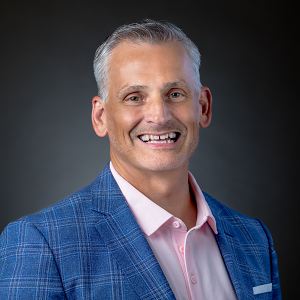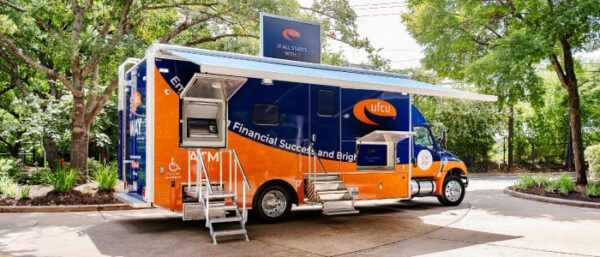Top-Level Takeaways
- UFCU’s mobile branch is breaking down barriers for underserved communities by providing convenient access to essential banking services, financial education, and trusted support right where people need it.
- The credit union builds trust by offering bilingual services, fostering personal connections, and partnering with local organizations to understand and meet the financial needs of residents.
Banking looks a lot different for Americans today than it did a decade or two ago. Unfortunately, even with evolving technologies that offer accessibility and convenience, millions of people remain under or unbanked.

In 2023, 5% of census tracts in Texas were classified as banking deserts, with another 5% at risk of becoming a desert if a branch were to close. This includes several regions surrounding the state capitol, home of University Federal Credit Union ($4.1B, Austin, TX).
Those who are unbanked must rely on alternative financial products and services such as payday loans, money orders, and pawn shop loans. In doing so, they run the risk of falling prey to high fees and even fraud.
Chris Turnley, UFCU’s executive vice president of member experience, says addressing this challenge has been a priority for more than a decade.
“People who are underbanked are 10 times more likely to use a check-cashing service than those who aren’t,” he says. “That really stuck out to us.”
Three years ago, UFCU proposed a new solution: If the community can’t easily access the credit union, then the credit union would bring a branch to the community.
UFCU unveiled its mobile branch at an event on Aug. 5, 2024, that featured a ribbon-cutting ceremony with community leaders and elected officials. The vehicle is the first of its kind in central Texas. Turnley says the goal is to better understand and serve the needs of these hard-to-reach communities.
“Our members are already here,” he says. “So, how do we remove some barriers?”
Driving Member Financial Success
UFCU’s mobile branch is equipped with all of the same security and services its brick-and-mortar locations provide. This includes ATM access, account set-up, instant-issue debit cards, and loan applications. It’s also outfitted with multiple monitors and speakers, giving it a vibrant, high-tech feel.
“We want it to be fun,” Turnley says. “We want people to be proud to be a part of it and not feel like they are getting second-rate services.”
In addition to banking services, the mobile branch also provides an opportunity to expand access to educational resources, from materials members can take home with them to presentations hosted by staff. Indeed, according to Turnley, the most common transaction is people asking questions. This is critical because one of the largest challenges for UFCU is establishing trust.
“These are people who might have been taken advantage of in the past, so it takes some time developing that relationship,” Turnley says. “We hire for empathy. That’s always been a big deal for us.”
Another challenge is overcoming the language barrier. Of the more than 961,000 people living within Austin city limits, more than 400,000 are Hispanic and at least 1% speak only Spanish at home.
To address this, the three members of the mobile branch team all are bilingual in Spanish and trained to provide guidance and direction using UFCU resources in both Spanish and English. When the need arises for a different language at a particular deployment, the mobile branch team leans on the larger UFCU team — many of whom speak multiple languages — to ensure they can support (most) desired languages.
Deepening Community Partnerships
Since its launch nearly two months ago, the mobile branch has had a full schedule of appearances in what has been dubbed The Howdy Tour. Its next stop will be Austin Community College’s South Campus on October 8.
In addition to these dates, UFCU has also leaned in on community partnerships, showing up at mobile health clinics, food distribution sites, local festivals, and sporting events.
“Our goal no matter what is to show up,” Turnley says. “It’s important to physically be out in the community and interacting with those we serve, whether we’re setting up a table somewhere or bringing the mobile branch. The first step is showing up.”

By partnering with trusted organizations like Foundation Communities and Equidad, UFCU is able to gain a deeper understanding of the needs of its outlying communities.
Turnley says as important as traditional metrics are, these insights will be invaluable as they will help UFCU eventually establish more permanent branches in these locations.
“What are we learning?” Turnley says. “What are our members telling us? What needs are there and how can we help meet them?”
For now, although UFCU’s mobile branch is still in its infancy, the credit union is optimistic about the positive results it is seeing in regard to member growth, deposits, and lending.
Find Your Next Big Idea At A Callahan Roundtable Join like-minded peers at a Callahan roundtable to talk about challenges, collaborate on solutions, and identify future hot topics. Callahan & Associates helps leaders share best practices — like how to reach unserved communities — build networks, and discover better ways to measure performance. Only a few remain. Find out how you can attend today.
